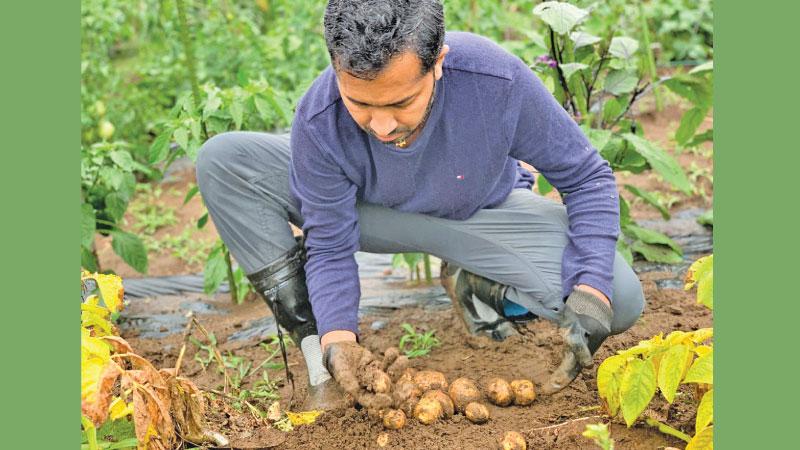
I have tested what I call one perch of community farming, where one person can produce enough harvest to feed two average families
Isuru Subasinghe is as an aspiring young politician who wants to bring about the most anticipated change in the country is yearning for. After working for years in Japan, he will be moving to Sri Lanka to help farmers through modern and innovative farming techniques. Isuru talks to Youth Observer about politics, agriculture and the change for Sri Lanka
Q: Tell us about the new method in agriculture you want to teach our farmers ?
 Farmers should be focused on using native crops, rather than the imported. They are better suited to the Sri Lankan environment and more resistant to local pests. As such you will need to use fewer chemicals - (pesticides and herbicides) and produce a nutritious organic product.
Farmers should be focused on using native crops, rather than the imported. They are better suited to the Sri Lankan environment and more resistant to local pests. As such you will need to use fewer chemicals - (pesticides and herbicides) and produce a nutritious organic product.
Using chemicals means a reduction in maintenance cost. Also making the best use of one’s land by farming according to season and weather patterns, while monitoring the supply and demand of crops.
For example, just because it’s the pumpkin cultivation season you don’t need to plant that crop. You can plant a different crop that isn’t already being sold by everyone else. Diversifying crops is better for all farmers.
In Sri Lanka, we still use techniques used decades ago. This is not because we don’t have good researchers, but the actual farmers lack access to the information about the techniques.
A good example is replacing flat land farming with dam elicited land farming which can significantly increase the harvest due to good air circulation. Even access to basic technology is helpful. Things like an accurate Weather Forecast is crucial for farming, and not just the temperatures, it should include the values for air quality, level of UV, sunlight PM 2.5 Electra, and the information should be easily accessible.
Q: Can you bring about change in the farming methods in Sri Lanka?
Absolutely! In fact, I have tested what I call one perch community farming, where one person can produce enough harvest to feed two average families. We have world-class agro researches support, I want to encourage the younger generation to engage in farming.
Q: How will you engage our youth to follow unconventional methods related to agriculture and the environment?
The younger generation is smart. They have access to information through the internet and smart devices. They can devise ways to make farming less labour intensive. Also creating a financial and social incentive which will encourage more young farmers.
If farmers are paid well and respected, then young people will be attracted to the work and willing to learn new styles of farming from other countries.
Q: Tell us a bit about yourself
I grew up in the Trincomalee Naval Base, did my G.C.E. O/L and G.C.E A/L in Bioscience at Bandaranayaka College, Gampaha, completed my degree at a Japanese university and Masters at a US university. Now I’m an innovation consultant to large corporations and to the Japanese government.
I also work all over the Asia Pacific region, as senior director of operations at a US-based innovation company.
My mother, the first Sri Lanka Navy Seva Vanitha primary school principal, is now retired. My father is a retired Navy officer.
Q: Are you planning to join politics in Sri Lanka?
I feel that we are all part of politics because we are all affected by government policies and decisions. So yes, I have decided that I want to take a more hands-on role to manifest the changes that I believe will benefit Sri Lanka.
Q: What Japanese values will you share with our communities?
Honesty, punctuality and respect for individuals.
In Japan, people don’t just work for money. Obviously, people make a comfortable living, but they also work for the greater good of society. Everyone is an important part of making the lives of all citizens better.
Q: The Japanese way of life, politicians and politics are respected the world over. Can Sri Lanka achieve that one day?
What Japan has achieved is remarkable. It’s mind blowing. The best part of it is they have been able to preserve their culture with rapid development.
No, we can’t change Sri Lanka in one day, we can work on making small changes first, things like running our train systems and businesses on time and with integrity.
Also reforming the education system so that the next generation is invigorated and prepared to carry Sri Lanka into a brighter future.
Q: How can Sri Lanka improve as a nation?
We have many resources - natural and human. If we focus our energy on working as a united people for the betterment of the country, we can succeed.
We need to set aside our differences, work on key issues like agriculture and technology and be open to learning from similar diverse and successful countries.
